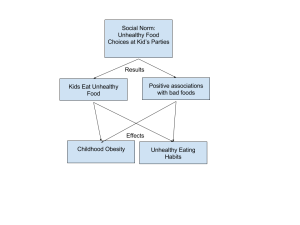A social norm that I have experienced regarding food – or in my case more specifically drink – is the typical beverages offered at kid’s parties. As a young child growing up I participated in a plethora of kids’ parties – from birthday parties to sports team celebrations – and one thing that I consistently had a problem with was beverage choices. Nobody ever had anything except Sprite and Coca-Cola, the issue being that I didn’t drink soda. Early on in my life it was connected to health reasons, as my parents of course wanted me to eat and drink healthy. Soda was something that was forbidden in my house until my sister and I had grown up a little bit and had more freedom to make our own choices about such a basic practice. After I had that decision I discovered that I never enjoyed the taste of soda and it was something I never drank. I began to bring my own Hawaiian Punch drink to kids parties so I would have something to drink and not be thought of as the weird kid that went against the social norm.
The societal issue this connects to is the relationship between food choice and nutrition. While I’m glad my parents helped keep me on the right track to stay healthy, it is clear that the social norm for children’s parties were pizza, soda, and cake. This social norm is detrimental to our youth and contributes to childhood obesity. I believe that this social norm has allowed the nations youth to believe that it is okay to indulge in unhealthy eating practices. It causes children to develop a positive association between having fun (at a party) and eating unhealthy foods. Taking a look at the healthy eating pyramid, you do not see Coca-Cola, pizza, cake, or any well known “party foods.” It is disturbing to not only have a large amount of obese children and adults, but the disproportionate amount of obese to famished – or borderline emaciated – people in the world.


Hey Dylan,
I thought your post was pretty interesting, especially your idea that we often identify “fun” with unhealthy foods. I can totally see that, I’m really glad your parents were able to teach you proper ideals as a child to help you throughout your life. I talked about the idea that parents are primarily responsible for the eating habits we develop throughout our life. Maybe this generation can get together and teach our children that unhealthy social norms aren’t right.
Ryan Gebhardt
Here’s my blog post if you want to check it out:
http://geog030.dutton.psu.edu/2016/03/04/ryan-gebhardt-the-virtue-of-moderation/
Hi Dylan, My name is Sara and for my post I chose to write about not eating meat on Fridays as part of my church’s social norm (you can find my blog post here http://geog030.dutton.psu.edu/2016/03/03/no-meat-on-fridays/).
I enjoyed reading your blog post and I think it is absolutely true. We don’t really see many vegetables and fruits being offered at parties as snacks, do we? Unfortunately, as you put it, this has become a social norm that especially children have come to expect. When I was younger, I never drank a lot of soda, however now it is even more rare because I have found that I can get terrible headaches from too much processed sugar. It’s good to see that even when given the choice, you chose not to “give into” this social norm, even though many others do.
Hi Dylan, I’m Ian. This is my blog post: https://wp.me/p3RCAy-bJb. I enjoyed your post because we had similar societal issues. Both were relating to junk food and beverages at parties and gatherings. My social norm however was a bit different and dealt more with eating healthy. I like how you linked the habits and effects in your diagram. It’s a shame that parties are always seen as a place to pig out and only consume junk food.